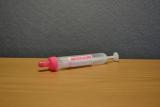Test Directory
MRD monitoring BCR::ABL1 E1A2 transcript
Containers - Adult

Red Cap Tube EDTA KE 9ml
|
Volume Range
Additive per Container
EDTA |
||||
Laboratory Site
WGH
Crewe Road South
Edinburgh
EH4 2XU
Edinburgh
EH4 2XU
Telephone: 0131 537 1000